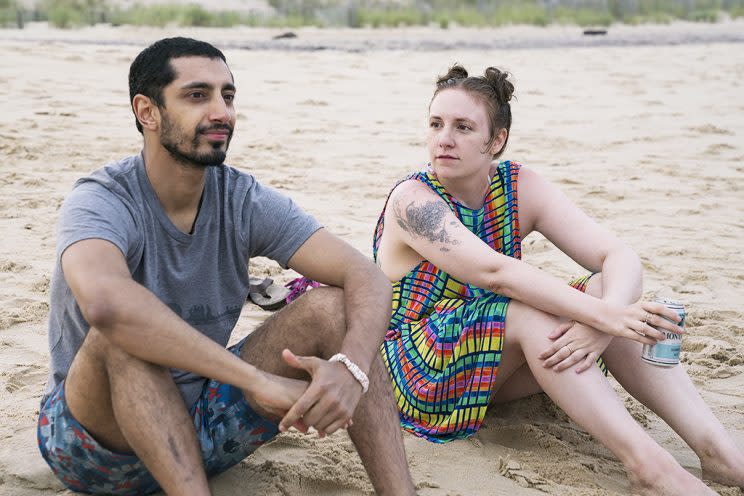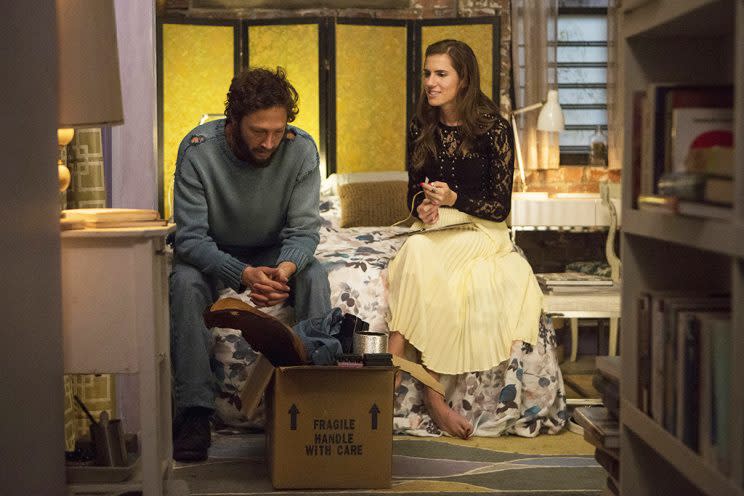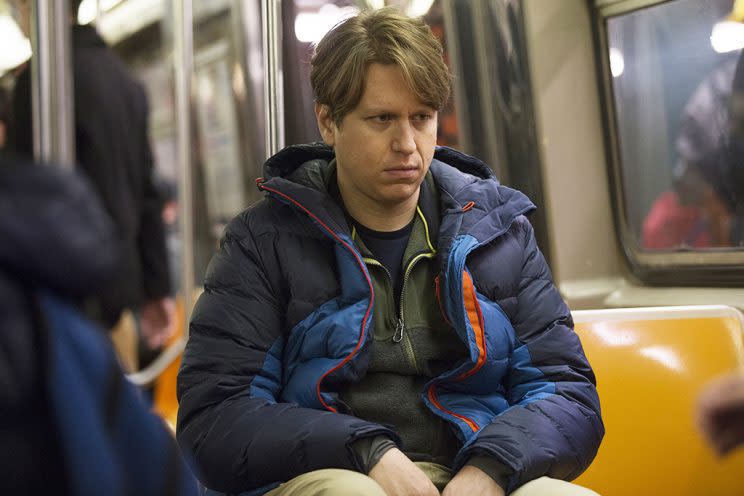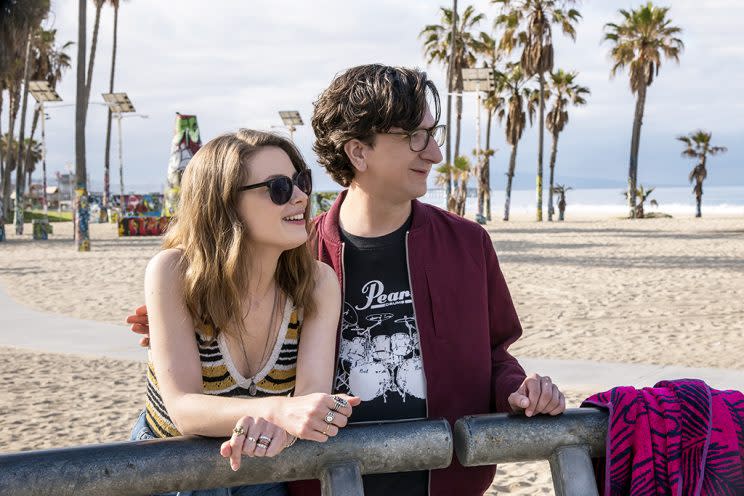Judd Apatow Talks Final Season of ‘Girls,’ His Next HBO Series, ‘Crashing,’ and the Return of ‘Love’

Once upon a time, television wasn’t very kind to Judd Apatow. Back at the turn of the millennium, the triple-threat writer/director/producer watched as his beloved comedies Freaks and Geeks and Undeclared were sent to the cancellation gallows despite terrific reviews and devoted fanbases. Turning his back on TV, Apatow went on to scale new heights of success with blockbuster big-screen comedies like The 40-Year-Old Virgin and Knocked Up.
And those success stories, in turn, led him back to television, this time with drastically different results. For the past five years, Apatow has been an executive producer of Lena Dunham’s acclaimed HBO series Girls, which is about to launch its sixth and final season on Feb. 12. The following week, he’ll unveil his next HBO series, Crashing, a peek at the contemporary New York standup comedy scene with comic Pete Holmes as our guide. And March 10 brings the second season of Love, Apatow’s popular Netflix series starring Paul Rust and Gillian Jacobs as a pair of Angelenos in the throes of a tortured romance. In a wide-ranging interview, Yahoo TV spoke with the prolific producer at length about his three shows and why he’s thrilled to be part of the cable and streaming arm of the so-called peak TV era.

Yahoo TV: Going into this last season of Girls, it must have been nice knowing that everyone was working toward a definitive endpoint.
Judd Apatow: It’s always fun to work on the last season of the series, because when you work on a show, you’re always trying to slow things down. There’s a natural momentum toward things working out or crashing, and you don’t want a lot of those things to happen, because if they do, the show is over! So it’s nice when you can do them, because you are actually ending the show. Some of the difficulty with this show was figuring out how to let the characters mature, and the rate at which they’re maturing. Last season, knowing that it was the second-to-last season, we were able to have fun with them getting a little bit smarter. Or, if they were stuck, it felt even worse because they’re reaching the end of their 20s and things still aren’t working out. That’s what happens with friends — some people get their lives together, and others just spin out and crash.
As you build toward the finale, how definitive will the conclusion be? Will there be some open-ended questions left for fans to think about?
Well, you can’t get definitive when you end a TV show. One thing that I keep thinking is that the end of The Sopranos is genius. Because there’s really no end for these characters; unless they all go down in a shipwreck, they’re going to live on, and we’re not going to know what happens afterward. And The Sopranos ending really captured that. As we worked on this season, I thought a lot about how different shows ended, and I think that the ending of this season of Girls is very interesting, and hopefully people will like it. But there’s almost no way to satisfy everybody, because people have their own hopes and dreams for what will happen to these characters.
Related: Ken Tucker Reviews Girls: Final-Season Fun And Fury
Some of my favorite Girls episodes are the standalone installments that pop up during the course of a season — like “One Man’s Trash” in Season 2 or “The Panic in Central Park” during Season 5. Are there any planned for this final year?
There’s one standalone this year that I think is really incredible. I’ve always enjoyed those episodes. Sometimes we’ll be talking about the arc for the season, and Lena will go off to write an episode, and then suddenly she’ll just hand in a little movie that has nothing to do with the rest of the season. She just gets inspired. We often never discuss those in the writers’ room, and they’ve been some of the best episodes of the series. Lena hasn’t made a movie since Tiny Furniture, but in a way, she’s gotten to make a whole bunch of movies during the life of the show.

Looking back on the legacy of the show, what do you think Girls achieved during its six-season run?
When the process started, it felt like a way of doing an independent film on television. We were trying to find a way to capture what Lena did with Tiny Furniture and do it every week on HBO. I feel like Lena shows so much courage to be honest in a way that people hadn’t really been before in television, both emotionally and with her willingness to be very explicit in portraying relationships and sexuality. I think she busted down a lot of walls by talking about things that haven’t been explored on television very often. Now there are a lot of shows that go that deep and that brutally honest, shows about women, and shows about men and women. If you look at television before Girls and after Girls, it’s changed a lot. I think she’s been a big part of this golden era of TV, and I think her work, along with Amy Poehler’s work and Tina Fey’s work, has inspired a lot of women to create television and to create and star in television. That’s a fantastic thing.
You can certainly see Girls’ influence on a show like Crashing, which also has a very scruffy, indie film-feel. What was the process of developing the series with Pete Holmes?
I met with Pete five or six years ago when doing his podcast, You Made It Weird. I didn’t even know who he was; his manager’s a friend of mine, so I was doing it as a favor, and I had such a great time. We did it in front of an audience at the South by Southwest festival, and the other guests were Kumail Nanjiani, Todd Barry, and Chris Gethard. Then he asked me to come on his TBS talk show, The Pete Holmes Show, and we did a filmed sketch where he was pitching me movie and TV ideas. One of those ideas was a series about Pete’s life after his wife cheats on him and he tries to be a comedian. In the sketch, I said, “Well, that’s just too sad. Who would want to watch that?” He was pitching it as a joke, but then we started talking about it, and we developed the idea.

I love exploring the world of comedians, and although there are some shows in which people play comedians, I don’t think any series really explores it deeply and fully like this. We see a young comedian in New York who isn’t good at his craft yet, so he struggles because he needs money and it’s hard to live in New York. Because he’s sleeping on different people’s couches, it gave us an opportunity to have all of our favorite comedians on the show. One week it’s Artie Lange, another week it’s T.J. Miller, and another week it’s Sarah Silverman. It’s a really great format to show how different people live.
Pete Holmes plays Pete Holmes on the show, and the guest stars all play themselves as well. Was that your intention from the beginning?
I used to work on The Larry Sanders Show, and I love when people play themselves. I think people are so interesting and rarely get a chance to tap into who they really are. So when we find someone like Artie Lange, we’re writing a story that’s fabricated, but within the making of that episode, we’re improvising and talking with Artie to discuss what his life is really like and what his struggles are. Some of it’s really hilarious, and sometimes it’s really sad and moving. That’s a unique feature of the show; the people aren’t really satirizing themselves. They’re actually trying to get very close to the truth of who they are. That’s something we tried to do at Larry Sanders — using people’s actual lives to get as close to the truth as we can while still telling a funny story.
Is the New York standup comedy community depicted in the series a mashup of the current scene, as well as the early ’90s when you were trying to make it as a comedian?
This is the modern version of trying to break into the comedy scene in New York. A lot of people bark — which means they hand out fliers all night — and if they can get enough people to go to a certain club, they’re allowed to go on at the end of the night in front of the last two people who haven’t left. It’s a brutal way to break in. There’s a lot of desperation for people just starting out. You have to be very strong, because sometimes they’ll only let you go on if you buy two drinks. Or you can only get on if you bring a certain amount of friends. There’s always the obstacles to getting stage time. So we’re trying to show how rough it can be to establish yourself and to get enough stage time to get better. It’s hard to get better when you’re performing for three people at 2:30 in the morning! [Laughs]
You mentioned Pete’s podcast, which is a new outlet for comedians to reach the public. Comics like Marc Maron, Scott Aukerman, and Lauren Lapkus are all finding a lot of success in that medium. Is that a phenomenon that interests you?
I hadn’t thought about that before, but I do think it’s true. When I was starting out, I looked up to people like Jay Leno and Jerry Seinfeld, but there were no podcasts, so you didn’t really get to know these people. I used to interview them for my high school radio station because I wanted to know who they were, and one of the reasons why I did that was because something like podcasting didn’t exist. We all love somebody like T.J. Miller, and one of the reasons why we like him is we might have heard him talk for hours and hours to another comedian and really reveal himself. We have much more intimate relationships with these comedians who we’re fans of [today].

Will Crashing have a season-long arc, or is it more of a couch-to-couch structure?
There is an arc in that Pete sleeps on a series of couches but also deals with larger problems over the course of the season. A lot of it is about: Can Pete keep his soul while trying to be a comedian in New York? We shoot it in New York, and we shoot on film. I said, “You know what? No one shoots on film anymore. None of these shows are on film. They all look the same, because they’re all digital.”
Crashing and Girls capture neighborhoods of New York you don’t often see on TV, and Love does the same thing for Los Angeles. Does Season 2 of Love continue to explore new areas of that city?
Yeah, we definitely open it up. There’s a funny storyline in the season where Gus [played by Paul Rust], gets a job on an action movie that’s shooting out of town. I always think it’s weird that there aren’t shows that take place in L.A. that accurately portray L.A. Our show focuses on the East Side and Silver Lake areas. So it’s fun to try to do that, because — as odd as it sounds — people don’t shoot in L.A. Even the shows that shoot in L.A., they’re doubling for Wisconsin or something.

The first season of Love ended with Gus and Mickey in a very strange place, emotionally. What can you tease about their relationship arc in the second year?
We’re trying to show every bump along the way as these people get to know each other. The whole idea of the show is to take a slower, closer examination of every nuance as people try to get into a relationship and make it work. It’s all about baby steps, and part of it is about what you hide from people when you first meet them and how it slowly comes out.
Related: Ken Tucker Reviews Season 1 of Love: Love Hurts, Love Is Strange, Love Forever Changes
Andy Dick had a memorable appearance in Season 1. Any special guest stars planned for Season 2?
There are a few episodes where David Spade plays the father of the teen actress Gus is tutoring, Arya, who’s played by my daughter, Iris. David’s character is a struggling actor who never did really well, but now his daughter’s doing very well. David’s one of my oldest friends, and he’s a great actor, so it was really fun to write a part where he gets to do something really unique.
Australian comic Claudia O’Doherty was the breakout star of Season 1 as Mickey’s roommate Bertie. She embarked on her own love story at the end of last season — will that continue?
I met Claudia when we were working on Trainwreck. I saw a bunch of her videos online and just immediately thought, “Oh, this is one of the great comic minds.” So while we were doing that movie, I said to her, “Hey, we have this new show, and we’d love for you to play this part.” She was even better than we could have imagined. And yes, one of the fun aspects of the second season is exploring her bizarre relationship with Randy, who is played by Mike Mitchell. We actually get to follow multiple relationships in the second season, and it’s funny, because Randy’s this sweet but unemployed guy who people aren’t sure about whether he’s a good person to date or not.

You’ve found lots of success in this new TV ecosystem, which stands in contrast to your early experience in the industry when shows like Freaks and Geeks and Undeclared were canceled before their time. Are you happier with the industry as it is now?
I love not working for network television! [Laughs] I think that’s a nightmare. With these streaming services, you shoot a season, they air it, and then maybe they want another season. You’re not in constant fear that you could get canceled tomorrow. The whole idea that you could be in the middle of your show and someone will just hand you a phone and go, “They want you to stop shooting right now,” is just the worst nightmare for a creative person, because you work so hard to build this world. These characters become so real to you, so it’s like making television with a gun to your head the whole time wondering if they’re going to shoot.
I’ve really enjoyed working with Netflix and HBO because they’re both very supportive, and their highest priority is doing something bold and creative. It wasn’t like that at network TV. They were always trying to dumb things down or make things more accessible. I feel like we’re in a very wonderful new world where all of these new networks and streaming services can only survive if the product is great. So you’re encouraged to be original, and that’s what you dream of. We’re having the best time.
The final season of Girls premieres Feb. 12 at 10 p.m. on HBO. Crashing premieres Feb. 19 at 10:30 p.m. on HBO. Season 2 of Love premieres March 10 on Netflix.
Read more:
Shades of Blue Season 2 First Look: ‘So Much Changes For Harlee’
Girls Review: A Final Season of Fun and Fury
Scandal Recap: So Close, And Yet So Far


